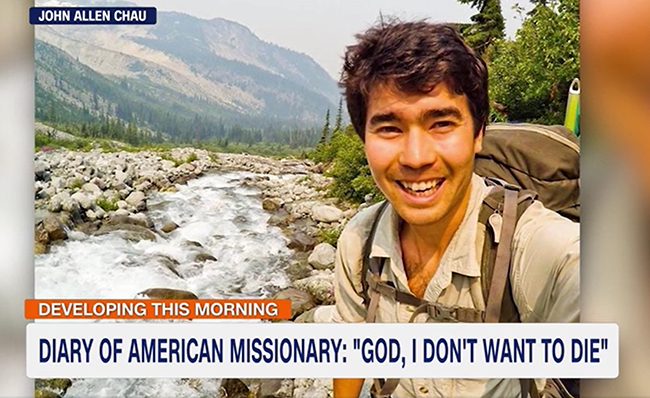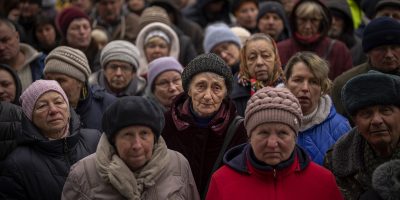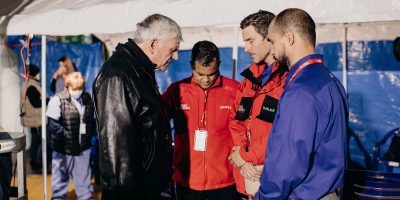The Sentinelese are an isolated people group known to rain down arrows on outsiders...
‘Crazy’ or called?: Missionary’s death debated

by David Roach
ANDAMAN ISLANDS, India (BP), Nov. 26, 2018 — The last reported sighting of American missionary John Allen Chau was Nov. 17. Fishermen off the coast of India’s North Sentinel island spotted what they thought was his lifeless body being dragged across the beach and buried by members of the Sentinelese tribe.
The Sentinelese are an isolated people group known to rain down arrows on outsiders who visit their home island in the Bay of Bengal. Though he knew the danger, Chou, 26, went as a missionary to the Sentinelese because they are reportedly among the world’s 400-600 unengaged unreached people groups (UUPGs) that have no contact with the outside world. In all, approximately 3,200 of the world’s 11,576 people groups are defined as UUPGs.
“You guys might think I’m crazy in all this but I think it’s worthwhile to declare Jesus to these people,” Chau wrote in his last note to his family, according to media reports.
Chau’s apparent death has drawn reports in major media outlets across the world and has sparked discussion among evangelicals. While there has been nearly universal agreement among believers about the heroism of Chau’s effort to reach the Sentinelese with the Gospel, mission strategists continue to discuss the wisdom of his methods.
Was Chau’s landing on North Sentinel island via kayak and subsequent announcement of God’s love to the Sentinelese “the best strategy?” asked Keith Eitel, dean of the Roy Fish School of Evangelism and Missions at Southwestern Baptist Theological Seminary. “We don’t know.” Yet to be seen “is the inspirational impact of such a martyrdom,” he said, noting the impact of the 1956 martyrdom in Ecuador of missionary Jim Elliot and four of his colleagues when they tried to reach an uncontacted UUPG.
On the night of Nov. 14, Chau, who served with the missionary organization All Nations, paid a group of fishermen to take him to North Sentinel, according to media reports. For two days he used a kayak to travel the half mile from the boat to the shore and make preliminary contact with the Sentinelese. At one point a child reportedly shot an arrow at him that pierced his waterproof Bible. Chau apparently offered the Sentinelese fish and other small gifts before they killed him.
According to the missions website JoshuaProject.net, the Sentinelese are “dark, tall people who hunt, gather, and fish” and are “completely isolated from the rest of the world.” Attempts by the Indian government to make peaceful contact were met “with arrows and stones,” so “the Indian government now leaves them alone and entering the North Sentinel island is not allowed.” PeopleGroups.org, another missions website, reports the Sentinelese practice “ethnic religions” and not Hinduism or Islam like many other Indians.
Online estimates of the number of Sentinelese range from 40-500.
R. Albert Mohler Jr., president of Southern Baptist Theological Seminary, devoted most of his podcast The Briefing to Chau’s death today (Nov. 26). “It’s important for Christians to understand it is always right and never wrong to share the Gospel with anyone,” Mohler said, “whether or not they are believed to be a part of either a reached or an unreached people group. But methodology is important here.”
“To put the matter bluntly,” Mohler said, Chau’s evangelistic method “is not the way that most modern missions organizations would seek to reach this kind of group. That doesn’t mean that they wouldn’t demonstrate the same kind of courage. It doesn’t mean that missionaries even today are not serving under the threat of martyrdom and often facing the reality of martyrdom.”
Eitel told Baptist Press the best way to reach an uncontacted UUPG generally is first to gather as much information about them as possible. Then find someone with a cultural link to that people group and let them introduce the missionary.
“Could there be some of these people” living outside the people group’s isolated community “that could be reached and then could actually then themselves go back in safely” to “open the door” for missionaries “to come behind them?” Eitel asked. If not, perhaps someone from a group with a “cultural kinship” to the uncontacted UUPG could help.
A Southern Baptist missions researcher familiar with South Asia told BP the best strategy for reaching uncontacted UUPGs generally is to work with local partners and find people with some cultural similarities to the uncontacted people group to make initial contact. In some cases, he said, access can be attained by offering to meet a felt need of the people.
Articles posted on the International Mission Board’s website explain that IMB personnel use a six-part strategy to complete the missionary task with various people groups around the world: “entry,” “evangelism,” “disciple making,” “church formation,” “leadership development” and “exit and partnership.”
“Churches, with their diverse membership, are uniquely equipped to play a vital role in using their creativity to help missionaries enter and establish a credible presence among a given people,” IMB mobilization team member D. Ray Davis wrote in one article. “Business or medical professionals have skills to offer that open doors and build relational bridges. Business owners can create opportunities for entry by providing employment. Doctors and nurses can gain access during long-term assignments or short-term projects by meeting human needs.”
Despite the need for effective entry methods to a people group, Eitel said, sometimes a missionary may be called to attempt bold evangelistic campaigns that imperil their lives.
“If you can’t contact anybody” in the group you’re trying to reach, Eitel said, “then try to only venture in when you know beyond a shadow of a doubt that even if it costs you your life, that this is what God wants you to do.”
If God called Chau to make such a sacrifice, Eitel said, his death may inspire other missionaries to reach the Sentinelese and other uncontacted UUPGs for years to come.
The original story can be found at: http://www.baptistpress.com/52019/crazy-or-called–missionarys-death-debated
Reprinted from Baptist Press (www.baptistpress.com), news service of the Southern Baptist Convention.

David Roach
David Roach is chief national correspondent for Baptist Press, the Southern Baptist Convention's news service. BP reports on missions, ministry and witness advanced through the Cooperative Program and on news related to Southern Baptists' concerns nationally and globally.




Comments are Closed